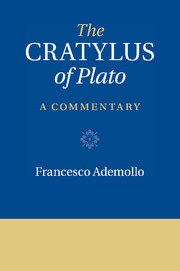Book contents
- Frontmatter
- Contents
- Preface
- Preliminary note
- List of abbreviations
- Introduction
- 1 Cratylus' naturalism (383a–384c)
- 2 Hermogenes' conventionalism (384c–386e)
- 3 Naturalism defended (386e–390e)
- 4 Naturalism unfolded (390e–394e)
- 5 Naturalism illustrated: the etymologies of ‘secondary’ names (394e–421c)
- 6 Naturalism illustrated: the primary names (421c–427e)
- 7 Naturalism discussed (427e–433b)
- 8 Naturalism refuted and conventionalism defended (433b–439b)
- 9 Flux and forms (439b–440e)
- Appendix 1 The text of 437d10–438b8
- Appendix 2 Some interpolations and non-mechanical errors in W and δ
- References
- I General index
- II Index of ancient texts
- III Index of Greek expressions
- IV Index of words discussed in the Cratylus
8 - Naturalism refuted and conventionalism defended (433b–439b)
Published online by Cambridge University Press: 25 October 2011
- Frontmatter
- Contents
- Preface
- Preliminary note
- List of abbreviations
- Introduction
- 1 Cratylus' naturalism (383a–384c)
- 2 Hermogenes' conventionalism (384c–386e)
- 3 Naturalism defended (386e–390e)
- 4 Naturalism unfolded (390e–394e)
- 5 Naturalism illustrated: the etymologies of ‘secondary’ names (394e–421c)
- 6 Naturalism illustrated: the primary names (421c–427e)
- 7 Naturalism discussed (427e–433b)
- 8 Naturalism refuted and conventionalism defended (433b–439b)
- 9 Flux and forms (439b–440e)
- Appendix 1 The text of 437d10–438b8
- Appendix 2 Some interpolations and non-mechanical errors in W and δ
- References
- I General index
- II Index of ancient texts
- III Index of Greek expressions
- IV Index of words discussed in the Cratylus
Summary
In the section of the dialogue which we are going to explore in this chapter, Socrates finally engages in a complex and powerful criticism of the very core of naturalism. The section can be divided into two parts. In the first part (433b–435d), to be dealt with in §8.1, Socrates, after rehearsing some previous conclusions, criticizes the naturalist view that names are naturally correct and that their natural correctness consists in their being similar to their referents. In the second part (435d–439b), to be dealt with in §8.2, Socrates turns to the related view that knowledge of names yields knowledge of their referents.
RESEMBLANCE AND CONVENTION IN NAMES (433B–435D)
Preliminaries (433b–434b)
Cratylus' answer at 433b6–7 seemed to show that he was meekly yielding to the arguments of Socrates. This latter then hammers his point home:
so. So, since we're agreed on these points, let us then examine the following question. If the name is, as we say, to have been imposed finely, must it contain the appropriate letters?
cr. Yes.
so. But those letters are appropriate which are similar to the objects? [προσήκει δὲ τὰ ὅμοια τοῖς πράγμασιν;]
cr. Of course.
so. Therefore those that have been set down finely have been set down so [Τὰ μὲν ἄρα καλῶς κείμενα οὕτω κεῖται]. But if some has not been imposed finely, for the most part it might perhaps be composed of appropriate and similar letters, if it is to be an image, but it would also contain something inappropriate, because of which the name would not be fine or finely made [εἰ δὲ μή τι καλῶς ἐτέθη, τὸ μὲν ἂν πολὺ ἴσως ἐκ προσηκόντων εἴη γραμμάτων καὶ ὁμοίων, εἴπερ ἔσται εἰκών, ἔχοι δ᾿ ἄν τι καὶ οὐ προσῆκον, δι᾿ ὃ οὐκ ἂν καλὸν εἴη οὐδὲ καλῶς εἰργασμένον τὸ ὄνομα]. […]
- Type
- Chapter
- Information
- The Cratylus of PlatoA Commentary, pp. 383 - 448Publisher: Cambridge University PressPrint publication year: 2011

